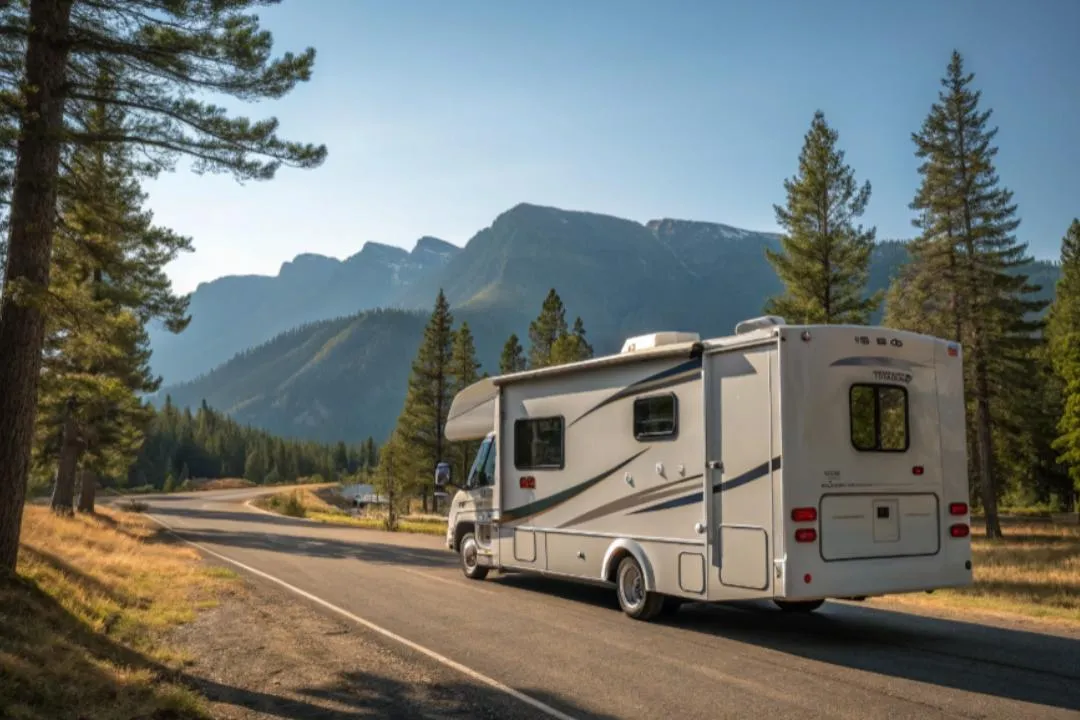
How to Register Your RV: Complete Step-by-Step Guide
RV ownership opens a world of adventure from exploring national parks to reliving the charm of a restored vintage camper at a classic rally. Before you hit the highway one crucial step ensures your journey is legal and secure: RV registration. This process confirms your recreational vehicle meets state and federal regulations protecting your investment and enabling seamless travel. With 50 states enforcing diverse rules and various RV types registration can seem overwhelming.
This comprehensive guide equips first time RVers full time nomads and vintage RV enthusiasts with a clear roadmap. It covers everything from essential documents to state specific nuances offering practical insights to help avoid pitfalls and optimize costs. For more on common errors, our common RV registration mistakes guide reveals slip ups you cannot afford.
RV Registration Essentials
Definition of RV Registration
RV registration is the legal process of documenting your recreational vehicle with a state Department of Motor Vehicles or equivalent agency granting permission to operate or tow it on public roads. It covers motorhomes travel trailers fifth wheels pop up campers and truck campers each with unique requirements. The process involves submitting documents such as titles and proof of insurance paying fees and meeting safety or emissions standards which vary by state and RV type.
Registration ensures compliance with local laws allowing travel without legal hurdles. It verifies ownership which is vital for securing insurance reselling your RV or resolving disputes. For instance motorhomes require license plates and often emissions tests while towed trailers may need only a registration sticker tied to the tow vehicle insurance. It is the cornerstone of legal RV travel. For RV types, see Wikipedia page on recreational vehicle.
Importance of Registration
Registering your RV is more than a formality it protects your travel plans and financial investment. Legal compliance avoids fines ranging from $50 to $1,000 across states. California for example levies up to $500 penalties for unregistered motorhomes while Texas charges $200 to $300. Registration is essential for insurance coverage as most insurers require it to process claims. A 2025 RV Insurance Association survey found 80 percent of claims for unregistered RVs were denied leaving owners liable for thousands in accident costs.
Registration enhances resale value particularly for vintage RVs by proving ownership. A 2025 RV Market Study noted registered classics sold 15 percent higher than unregistered ones. Non compliance risks travel restrictions as some campgrounds and states demand proof of registration and in severe cases impoundment with $500 to $2,000 retrieval fees. Registration also unlocks benefits like historical vehicle status reducing fees and taxes.
Registration Process Overview
The registration process follows a structured path tailored to state regulations:
Gather Documents: Collect the title proof of insurance ID and inspection certificates safety emissions or VIN verification.
Complete Application: Fill out the state registration form detailing RV specs like make model and VIN.
Pay Fees: Cover costs $12 to $890 and taxes sales or property based on RV type and state.
Submit to DMV: File online like Florida by mail like Montana or in person like New York.
Receive Plates or Stickers: Motorhomes get plates towed RVs get stickers displayed as required.
Plan Renewals: Most states require annual or biennial renewals $10 to $500.
Vintage RVs may need documentation for historical status proving 30 plus years of age and limited use. Processing takes 1 to 3 days in person 3 to 10 days online or 2 to 6 weeks by mail. New purchases have 20 to 60 day deadlines like Alabama 20 days with $50 to $500 late fees.
Core Registration Requirements

Essential Documents
Registration requires these documents:
Title or Bill of Sale: Proves ownership bills of sale suffice for towed RVs in states like Vermont.
Proof of Insurance: Meets state minimums like $25,000 or $50,000 bodily injury in Texas.
Identification: Driver license or state ID.
Inspection Certificates: Safety emissions or VIN verification per state rules.
Registration Application: State specific form.
Odometer Disclosure: For motorhomes under 10 years.
Vintage RVs may need bonded titles or historical affidavits. Preparing these documents prevents delays. For no title fixes, our register motorhome without title USA by state guide has state breakdowns you need.
Fee and Tax Structures
Fees vary by RV type weight and state:
Motorhomes: $100 to $890 like California $200 to $890 Florida $75 to $225.
Towed RVs: $12 to $200 like Texas $40 to $100.
Truck Campers: $12 to $100 where required like Idaho $20 to $50.
Weight based fees like California $10 per 1,000 pounds increase costs. A 2025 DMV report estimated motorhome fees at $150 to $350 and towed RV fees at $30 to $120. Taxes include sales tax, flat fee in Montana, 8.875 percent in New York and property tax 1 to 2 percent of value in Missouri.
For a $50,000 RV sales tax is $2,250 in South Dakota versus $4,000 in California. Vintage RVs may be exempt from property tax. For state costs, our California car registration costs guide shows breakdowns you cannot ignore.
State-Specific Regulations
Rules differ across states:
Deadlines: 20 to 60 days for new purchases like Alabama 20 days Texas 30 days.
Renewals: Annual $10 to $500 or biennial like Arizona.
Submission: Online Florida mail Montana or in person New York.
California requires emissions tests for motorhomes Florida does not. Towed RVs may skip registration in Vermont if insured under the tow vehicle. Check DMV websites for specifics. For best states, our best states to register RV list spots top picks.
Motorhomes vs. Towed RVs
Motorhomes treated like cars need plates emissions tests in some states and insurance with fees of $100 to $890. A Class A motorhome in California requires smog checks and $200 to $500 fees. Towed RVs need stickers and often tow vehicle insurance costing $12 to $200. A Texas fifth wheel may cost $40 to $100 with no emissions test. Motorhomes face stricter rules due to their self propelled nature.
VIN Numbers Demystified
Role of VINs
The Vehicle Identification Number or VIN a 17 digit code post 1981 verifies RV identity and ownership. It ensures documents match the vehicle supports insurance claims and boosts resale value by 10 to 15 percent per a 2025 RV Market Study. Missing or mismatched VINs delay registration or raise fraud concerns. Pre 1981 RVs with non standard VINs need DMV verification.
Locating RV VINs
Motorhome VINs are on the dashboard door frame or engine block. Towed RVs have VINs on the trailer tongue or frame. Truck campers may have VINs inside or on the frame. Vintage RVs VINs may be faded or on manufacturer plates. Cross check with documents. Texas offers VIN reassignment $50 to $200 for missing numbers after inspection. For mismatches, our car title VIN mismatch tips has solutions you need.
Insurance for RV Registration
Mandatory Insurance Types
Most states mandate liability insurance covering bodily injury $25,000 or $50,000 in Texas and property damage $25,000 in Texas. Optional comprehensive coverage protects against theft or weather damage ideal for vintage RVs while collision covers accident repairs. A 2025 Insurance Journal report found 65 percent of owners added comprehensive RVs over $30,000.
State Coverage Minimums
California: $15,000 or $30,000 bodily injury $5,000 property damage uninsured motorist coverage.
Florida: $10,000 property damage $10,000 personal injury protection.
Texas: $30,000 or $60,000 bodily injury $25,000 property damage.
New Hampshire allows financial responsibility proof. Confirm policies meet standards.
Rental RV Insurance
Renting out your RV like via Outdoorsy requires specialized policies like Roamly covering renter liability and comprehensive damage. Standard policies exclude rentals. Roamly 2025 data showed 30 percent of owners rent RVs with policies costing $500 to $1,500 yearly. Verify coverage before registering.
Truck Camper Registration Rules
States Requiring Registration
Idaho Oregon and Washington mandate truck camper registration $12 to $100 treating them as trailers. Michigan and Montana require titling only. California and Florida need insurance under the truck policy no registration. Idaho charges $20 to $50 with a displayed sticker.
Registration Process for Truck Campers
Where required:
Submit title or bill of sale insurance and ID.
Pay $12 to $100 fees.
Display sticker on camper or truck.
Confirm state rules to avoid fines during travel.
Top States for Motorhome Registration
Evaluation Criteria
Consider:
Sales Tax: Flat fee in Montana to 8.875 percent in New York.
Fees: $12 to $890.
Renewals: $10 to $500.
Insurance: Varies by minimums.
Residency: Ease for full timers.
A 2025 RV Life survey ranked states for affordability.
Preferred States for RVers
Florida: Fees $75–$225; easy registration and minimal inspections.
Texas: Fees $40–$200; online registration and RV-friendly.
South Dakota: Fees $12–$100; easy residency and simple registration.
State-Specific Advantages
Florida: No inspections historical plates.
Texas: No emissions tests in most counties streamlined renewals.
South Dakota: Low insurance minimums one night residency.
Paperwork Simplified
Document Checklist
Title
Registration application
Insurance proof
Inspection certificates
Odometer disclosure
ID
Vintage RVs may use bills of sale or bonded titles.
Document Acquisition Methods
Title: From seller or bonded title like Texas $100 to $500.
Insurance: From Progressive or Geico.
Inspections: At Jiffy Lube or smog shops.
Application: DMV websites.
Bonded titles resolve 20 percent of vintage RV cases per a 2025 survey. For bonds, our how to get bonded title classic car USA guide applies to RVs too.
State-by-State Registration Guide
State Regulations
Alabama: 20 day deadline $15 to $200 fees annual renewals.
California: $50 to $890 fees smog checks 20 day resident deadline.
Alaska: $100 motorhome fee; biennial renewals and simple registration.
Vintage RVs may skip titling like Georgia or emissions like California pre 1976. Historical plates $10 to $50 reduce costs in Florida and Texas. For California details, our car title transfer process California guide shows transfer steps.
Classic and Vintage RV Registration
Characteristics of Classic RVs
Vintage RVs 30 plus years old pre 1995 include Airstreams or Winnebagos qualifying for historical status with reduced fees and tax exemptions.
Registration Challenges
Missing titles non standard VINs and safety upgrades $500 to $2,000 complicate vintage registration. Historical status offers tax breaks but limits use.
Titling Vintage RVs
Use bills of sale Vermont bonded titles Texas or court ordered titles California $500 to $1,500 for untitled RVs. A 2025 survey found 25 percent used bonded titles.
Advantages and Disadvantages
Advantages: Tax exemptions $10 to $50 fees prestige plates.
Disadvantages: Limited use safety upgrades ownership proof issues.
RV Titling Explained
Importance of Titles
Titles prove ownership enabling registration insurance and resale 10 to 20 percent value boost. Motorhomes require titles some states accept bills of sale for towed RVs.
Titling Without a Title
Want to understand state by state procedures for untitled RV registration? See Motorhome Registration Without Title State by State USA.
Title Transfers
Sellers sign title release buyers submit title bill of sale and fees paying sales tax like 6.25 percent in Texas. Out of state transfers may need VIN inspections.
Sellers sign title release buyers submit title bill of sale and fees paying sales tax like 6.25 percent in Texas. Out of state transfers may need VIN inspections.
Driver Licensing for RVs
License Requirements
Standard licenses cover RVs under 26,000 pounds. Class B licenses needed for heavier motorhomes California and endorsements for towing over 10,000 pounds Texas. 85 percent of drivers use standard licenses per a 2025 FMCSA study.
State License Variations
California: Class B for 26,000 plus pounds Class A for towing 10,000 plus pounds.
New York: Endorsement for trailers over 3,000 pounds.
Florida: Standard for under 26,000 pounds.
Fines for improper licenses range from $100 to $1,000.
Full-Time RV Living
Registration State Selection
South Dakota 4.5 percent sales tax $12 to $100 fees Texas 6.25 percent sales tax $40 to $200 fees and Florida 6 percent sales tax $75 to $225 fees are ideal for low taxes and residency ease.
Residency Setup
South Dakota needs one night stay and a mail forwarding address Americas Mailbox. Texas requires a physical address and 30 days presence. Florida needs a mailing address and intent to reside.
Tax Implications
Sales and Property Taxes
Sales tax 4.5 percent in South Dakota 8 percent in California and property tax 1 to 2 percent in Missouri apply. Vintage RVs may be exempt in Florida or Texas.
Benefits of Tax-Friendly States
No income tax states save $1,500 to $5,000 yearly. Low sales tax and fees reduce upfront costs.
For tax saves. our Flat Fee RV registration in Montana guide shows how you cut big.
Legal Considerations
Vintage Vehicle Regulations
Vintage RVs 30 plus years old may qualify for historical plates $10 to $50 and exemptions like no emissions in California. Limited use may apply.
Modified RV Compliance
Modified RVs need safety and VIN inspections for brakes lights and tires to meet state and DOT standards.
Federal Standards
DOT requires compliant brakes lights and tires even for vintage RVs ensuring road safety.
Common Registration Pitfalls

Paperwork Gaps
Missing titles or insurance delays registration. 25 percent of vintage RV owners lack titles per a 2025 survey. Use checklists and bonded titles.
Fee Miscalculations
Misclassifying RVs inflates costs. Confirm specs with DMV calculators. Historical status saves $10 to $50.
Registration Updates After Moving
New residents must re register within 20 to 90 days like California 20 days. Fines for delays $100 to $1,000.
Why Choose Street Legal Hookup for RV Registration
Navigating RV registration can be a maze with state specific rules and vintage RV complexities posing challenges. Street Legal Hookup brings decades of real world experience having successfully registered thousands of RVs across all 50 U.S. states. Our team of experts specializes in untangling issues like missing titles non standard VINs and state compliance ensuring a seamless process.
Whether you are a full time RVer establishing residency in South Dakota or restoring a 1970s Airstream with no paperwork our proven expertise saves you time and prevents costly errors. Trust Street Legal Hookup to handle your registration with precision schedule a consultation today to get your RV road ready.
RV Registration FAQs
Can I Register in Another State?
Yes if you establish residency like a mailing address and one night stay in South Dakota. Non resident registration is limited and requires proof of primary residence. Check DMV rules for eligibility.
What If My RV Lacks a Title?
Use a bill of sale with VIN inspection like Vermont or apply for a bonded title like Texas $100 to $500 bond. Court ordered titles like California are an option for complex cases.
How Often Must I Renew?
Most states require annual renewals $10 to $500. Others like Arizona offer biennial options. Vintage RVs with historical plates may have lower renewal fees often $10 to $50.
Special Rules for Vintage RVs?
Vintage RVs 30 plus years may skip titling like Georgia or emissions like California pre 1976. Historical plates $10 to $50 reduce costs in Florida and Texas.
How Much Are Registration Fees?
Fees range from $12 to $890 based on RV type weight and state. Motorhomes cost $100 to $890 towed RVs cost $12 to $200. Check your DMV for exact costs.
Is Insurance Mandatory?
Yes liability insurance is required in most states like $25,000 or $50,000 in Texas. New Hampshire allows proof of financial responsibility instead.
Conclusion
RV registration is your gateway to legal, stress-free travel, whether driving a modern motorhome, towing a trailer, or restoring a vintage classic. This guide covers every facet, from securing titles and insurance to navigating state regulations. By choosing states like South Dakota, Texas, or Florida and avoiding pitfalls like missing paperwork or late submissions, you can ensure a smooth and compliant registration process.
Verify requirements with your DMV to ensure a smooth process. For a hassle free experience rely on Street Legal Hookup in U.S. states. Book a consultation at https://streetlegalhookup.com/ or call to start your 406-333-1020 adventure with confidence.



